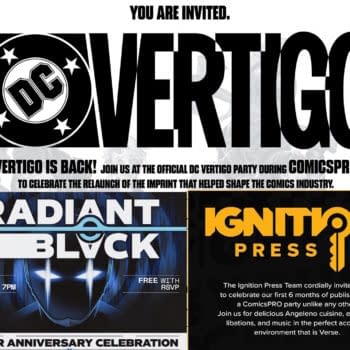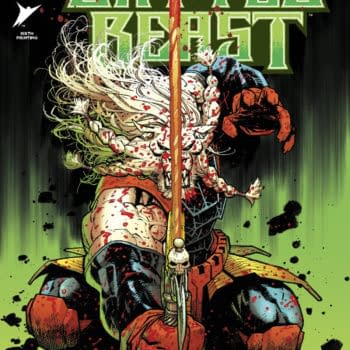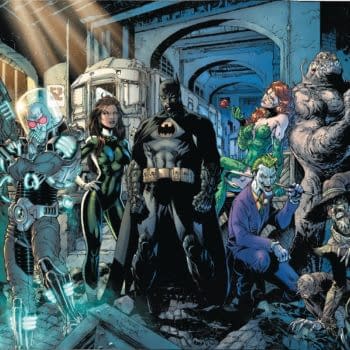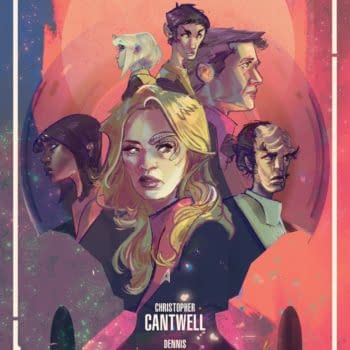Posted in: Comics | Tagged: before watchmen, budgie, lee barnett, warren ellis
The Adult In The Room – A New Column By Lee Barnett
Ricki Tarr has not lied to us, not in any material way. He has simply done what agents the world over do: he has failed to tell us the whole story. – George Smiley, TINKER TAILOR SOLDIER SPY.

And no, I'm not writing about the permanent continuation of suspense that is an inherent necessity in any piece of fiction, although I still object to editorial decisions, PR and cover blurbs that flat out lie to readers.
Instead, I mean the lazy and quite frankly negligible acceptance by so many folks of whichever 'side' of a contentious news story you agree with, without acknowledgment that's it's probably more complicated than what's presented in a puff piece or PR statement. Occupy? Presidential debates? No – the comic book industry, the creators and personalities in this entertainment medium.
It's truly astonishing how, at a time when so many stories in comics are dealing with the complexities of moral choices, the psychological tests with which characters are faced, that stories about comics so often come down to who the reader thinks is the goodie and who's the baddie.
And with the possible exception of politics, sports and religion – possible, mind you – I can't think of any other sphere of debate where the length of time an opinion is held, and the ferocity with which it's expressed, somehow equates to its validity.
Any look at message boards over the past few months repeatedly confirms the above point of view; Before Watchmen, companies asserting pre-existing rights over characters, the never-ending debate about the respective merits of creator owned vs. work for hire. No matter; in every case, the deal seems to be that that you're obliged pick your side and stick to it no matter what new information is revealed or highlighted. And those who disagree with you are somehow less because they disagree, no matter the reasons or personal knowledge of the details for that disagreement.
Why do we need goodies and baddies in the real world? For ease. To make it simple for us. To save us from having to think too hard.
It's lazy thinking of the worst kind.
And it's unworthy of us to criticise the ignorant masses who still think "comic books are for kids" while indulging ourselves in equally indolent slogan painting rather than proper debate.
The internet, message boards, instant messaging and Twitter has led to the exchange and dissemination of information between us on a scale unimaginable only twenty-five years ago. I attended my first comics convention in 1989 when I was in my mid-twenties – I didn't know a single other person there… in London at the time, there really wasn't (in my experience) a way of getting to know other people who read comics other than if you happened to see someone at one of the rare comics shops in London.
But comics has become something you share without, it often seems, developing the etiquette that usually comes along with social discourse.
Warren Ellis, in his collection of columns entitled COME IN ALONE, wrote that comics reading is a solitary hobby. That you may watch the telly with someone else, may go to a movie accompanied, but comics reading: that you only ever do on your own. Well, he's not so wrong there.
It's true – I can't recall a time when I gathered two or three friends together and waited for them to finish page seven of the latest issue of a comic book before turning over to page eight. OK, so where do I differ with Warren?
Warren ignored – quite deliberately, possibly – that these days, for better or worse, the enjoyment that one gets from comic books isn't limited to the enjoyment one gets from them while you're reading them. There's no doubt that reading the comics forms, for me at least, a large part of my enjoyment… but there's another part that I enjoy. The part that every fan of anything would recognise: talking with friends about the book. Analysing, guessing, and generally bitching about it…
Now that, by its very nature is – has to be! – anything but a solitary activity. I mean, some people might enjoy only talking to themselves and never getting any disagreement, but we're staying away from members of the British government today.
No, part of what makes the comics reading public a community, is that we talk to each other. Oh boy, do we talk to each other. Whether it be groups of people meeting for a drink, or chatting online, or conversing on message boards. And who, for years, ran a series of successful and message boards? Step forward, Mr Ellis.
'Literature' has sometimes been defined as 'that which you would wish to read again'. If you accept that definition (and I'm not altogether sure that I do) but if you accept it, than there's no way you can exclude comic books from the category of literature. Furthermore, when you read comic books again you're going to approach that rereading from a slightly different perspective each time.
Additional readings mean you approach the tale already familiar with the story, and its conclusion. That in itself surely must change your appreciation of the tale. You may not appreciate it more nor less, but it will be a different appreciation. How could it be otherwise?
One of the glories of talking to other people about something you've enjoyed, and appreciated, is discovering how many (or how few) people share not only your initial appreciation, but also your new take on the story.
Comics? Something you do alone? Only in two aspects: creation and immediate consumption. Everything else is enhanced by company.
But that brings us back to both the debate and discussion, and also to storytelling and lazy thinking because it's not only the comics themselves that are discussed: it's future stories that have yet to be told, and the industry itself that is discussed, often by folks who have nothing solid upon which to base that discussion. I wouldn't debate sports other than in a marginal way, because I'm neither interested in, nor have even a basic knowledge of, professional sports.
Ah, would that the same applied to people who take a pop at comics companies and comics creators without knowing much relevant information about either.
It's readily apparent that some believe that comics companies will always screw creators, given the opportunity, and therefore whenever they hear of a dispute between companies and creators, they take the creators' side, no matter what the facts are.
Or they extrapolate the reverse: they know of a situation when a company did – in their opinion – screw over a creator and… bingo! All companies always treat creators unfairly.
Neither is true – sometimes companies act unfairly, sometimes they act fairly. And while there are undoubtedly some venal, untrustworthy people on staff in comics companies, there are also people who are not only genuinely nice people, they care about the industry, the people working in it, and creators as well.
And let's not limit it to editorial, sales and PR folks in companies – creators have varying personal reputations ranging from the utterly well respected and trustworthy, to those with… less saint like reputations.
There's been recent discussion regarding the danger to creators' income via the potential of comics companies stamping down on practices prevalent in Artists' Alleys at various comics conventions, and criticising those companies for asserting rights they own.
Owners of intellectual properties exploit the intellectual properties they own. That's what owners of intellectual properties do. There's no moral, legal or ethical difference in that whether it's a major comic book company or a creator working out of his back room.
But somehow, to a proportion of the comics reading public – and to not a few creators as well – it's entirely different if it's a company that owns the intellectual property, say the rights to a character.
If it's a company that owns the character? Oh, then they're inherently wrong in pursuing their rights against people who infringe them.
You know what? Comics companies are more entitled to assert those rights than you're entitled to torrent a comic book merely because you can't be bothered to pay for it.
Lee Barnettis a writer. He's written comic books, radio comedy and two collections of short stories under the title THE FAST FICTION CHALLENGE. He's also a contributor to elephantwords. Known in the UK Comics industry for the annual Hypotheticals panel he devised and presented with Dave Gibbons at the UK Comics Festival, some people call him "budgie".












